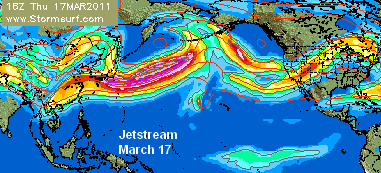By Michael Collins
An update of Post Nuclear Japan, Pre Disaster United States
Stormsurf.com (See the latest forecast)
The world is about to be shoved through the looking glass, head first.
New York Times: Japan Faces Potential Nuclear Disaster as Radiation Levels Rise
TOKYO -- Japan's nuclear crisis verged toward catastrophe on Tuesday after an explosion damaged the vessel containing the nuclear core at one reactor and a fire at another spewed large amounts of radioactive material into the air, according to the statements of Japanese government and industry officials. New York Times, March 15
The two critical questions over the next day or so are how much radioactive material is spewed into the atmosphere, and where the winds carry it.
"We are
on the brink. We are now facing the worst-case scenario," said Hiroaki
Koide, a senior reactor engineering specialist at the Research Reactor
Institute of Kyoto University. "We can assume that the containment
vessel at Reactor No. 2 is already breached. If there is heavy melting
inside the reactor, large amounts of radiation will most definitely be
released." New York Times, March 15 (approximately 2:15 ET)
The explosion recalls the Washington Post article of March 13. The meldown occurring, according to the New York Times report, is appalling. If the wind shifts direction, 103 million people are at risk on Japan's main island Honshu:
If a full meltdown occurs, a huge molten lump of radioactive material would burn through all containment, destroy the building and fall to the ground, exposed. A toxic stew of exotic radioactive particles would then spread on the wind and rain.
But if
luck turns south and the winds do, too, radioactive particles could be
spread far across Honshu, Japan's largest island, [103 million
population] and beyond. Washington Post, March 13
Russia TV presented a video of the explosion:
Video of blast at Fukushima nuke plant, radiation leak reported
"Who's on Third?" Information Cluster". at the UN and IAEA
Reuters ran a story on March 13 dismissing the health risks of radiation. Malcom Crick, Secretary of the United Nations Scientific Committee on the Effects of Atomic Radiation, was cited as an authority:
"This is not a serious public health issue at the moment," Malcolm Crick, Secretary of the U.N. Scientific Committee on the Effects of Atomic Radiation, told Reuters.
"It won't be anything like Chernobyl. There the reactor was operating at full power when it exploded and it had no containment," he said. As a precaution, around 140,000 people have been evacuated from the area around Fukushima.
Reuters tracked down the director general of the International Automic Energency Agency (IAEA), former Japanese diplomat. His comments came as the Times reported the current conditions "verging" on nuclear disaster:
(Note: You can view every article as one long page if you sign up as an Advocate Member, or higher).





